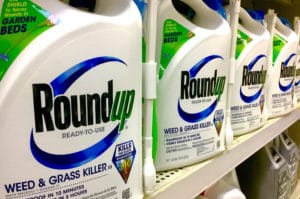
Glyphosate, the active ingredient in Roundup herbicide, has been linked to the development of some types of cancer despite its widespread use. In particular, many people have been diagnosed with non-Hodgkin’s lymphoma after being exposed to the weed killer.
What is Roundup and How Does It Work?
Roundup is a broad-spectrum herbicide used to kill weeds and other plants that compete with commercially farmed crops, such as corn, soybeans and cotton. In 1970, chemists from agricultural corporation Monsanto developed glyphosate, its main ingredient, as a potential water-softening agent. When it was discovered that this substance could be used as an weed killer, the corporation brought it to market in 1974, giving it its current commercial name.
Roundup has been used by farmers, farm workers, homeowners and gardeners to kill poison ivy, kudzu, dandelions and other unwanted weeds. It is one of the most widely used herbicides in the world, and some cities use the product to spray along sidewalks and crevices in the pavement where weeds potentially grow.
Glyphosate kills weeds by inhibiting a plant’s ability to synthesize essential proteins necessary for plant growth. Weeds and plants that have been sprayed with this chemical usually die within a week, after it has been absorbed into the plants’ leaves. When “Roundup Ready” (glyphosate-resistant) crops were introduced in the mid-1990s, sales of Roundup increased as many farmers began to use the newly developed genetically-modified seeds.
Roundup Cancer Risk

Due to the increased use of “Roundup Ready” crops, the popular herbicide, and the company that makes the product, Monsanto, have come under scrutiny for the product’s use and alleged links to adverse health effects. While some organizations, including the European Food Safety Authority (EFSA), have concluded that the evidence against Roundup is insufficient, the weed killer continues to be a polarizing topic of debate.
In a 2015 report issued by the World Health Organization’s International Agency for Research on Cancer (IARC), researchers concluded that glyphosate is “probably carcinogenic to humans” and that there is “sufficient evidence” in experimental animals for the carcinogenicity of glyphosate. While lawsuits allege an association between Roundup herbicide and non-Hodgkin’s lymphoma, a type of cancer that starts in the lymphatic system, exposure to Roundup may also be linked to other serious forms of cancer, including:
- Lung cancer
- Brain cancer
- Thyroid cancer
- Lymphoma
- Multiple myeloma
- Leukemia
- Chronic lymphocytic leukemia
Exposure Risks
Individuals, particularly farmers, farm workers, gardeners and landscapers, can be exposed to the product when using it treat their crops and plants. Roundup can be absorbed through the skin or eyes, or inhaled through the lungs. In some cases, it can also be ingested.
According to a National Pesticide Information Center factsheet, glyphosate exposure may have carcinogenic potential. Likewise, some studies have associated the use of glyphosate with lymphoma, a type of cancer that begins in cells called lymphocytes.
Other Side Effects
The use of chemicals and herbicides, as well as genetically modified crops, has lead some to wonder about the safety of such products. Research into the exact effects of Roundup on humans may warrant further investigation, however, some researchers claim that exposure to this substance may be correlated to a number of complications and side effects, including Parkinson’s disease, Alzheimer’s, kidney disease and autism.
Monsanto Roundup Lawsuit Claims
Roundup lawsuits allege that regular use of the product led to the diagnosis of non-Hodgkin’s lymphoma. According to a lawsuit filed in July 2016, the plaintiff claims that he developed the cancer after over 40 years of using Roundup and that Monsanto “made conscious decisions not to redesign, warn or inform the unsuspecting public” of the dangers associated with the herbicide. As a result, the manufacturer “risked the lives of consumers and users of its products,” knowing that there were safety issues related to the use of Roundup and glyphosate-containing products.





